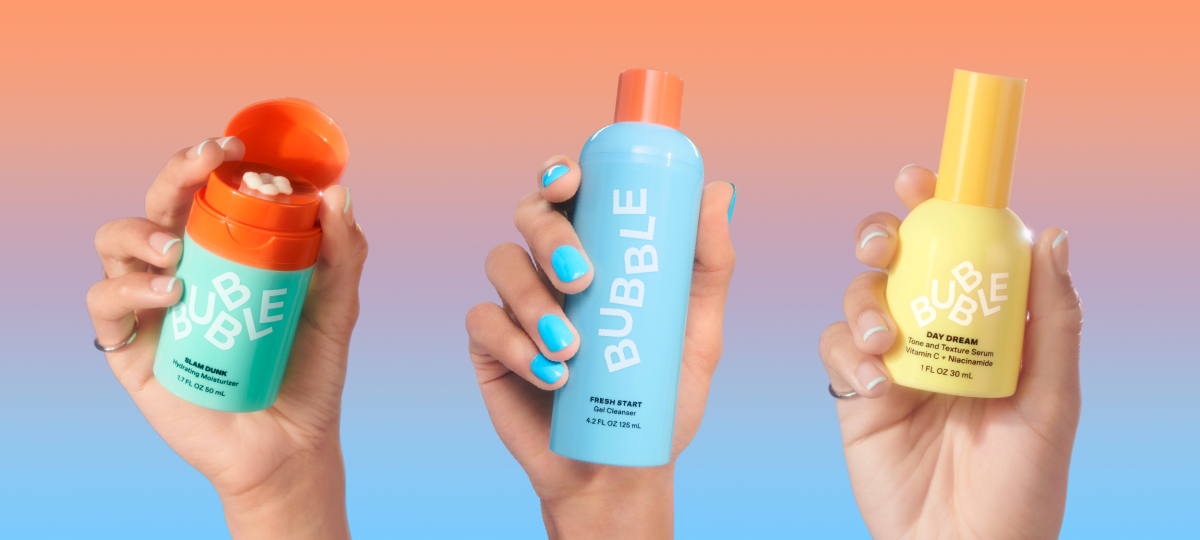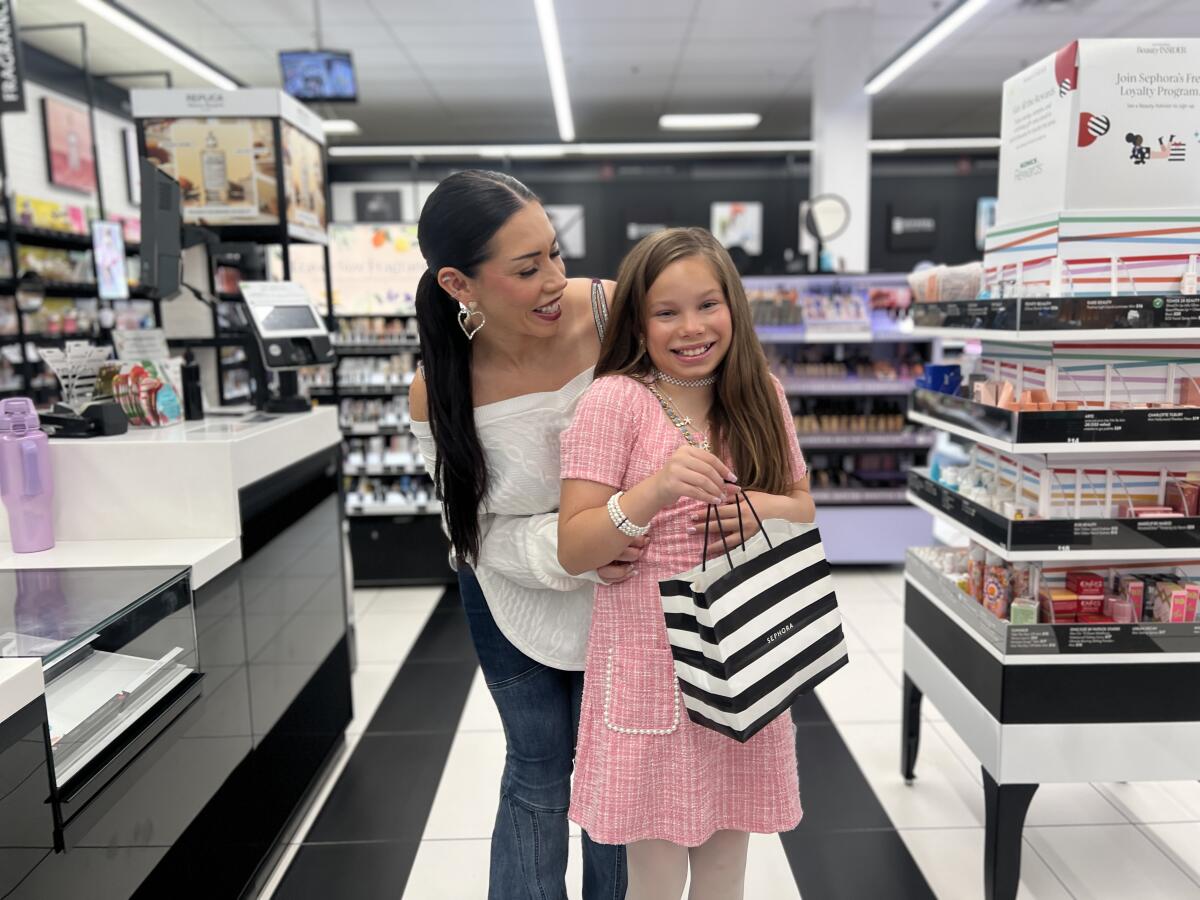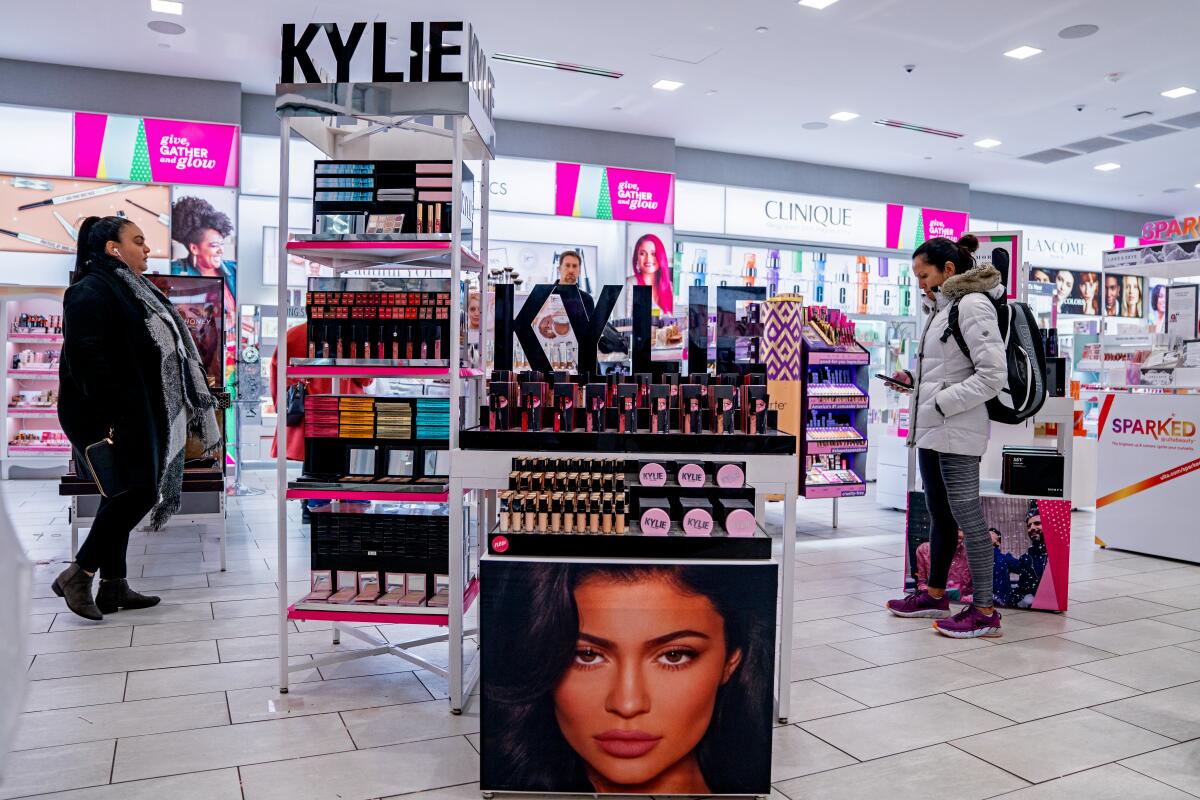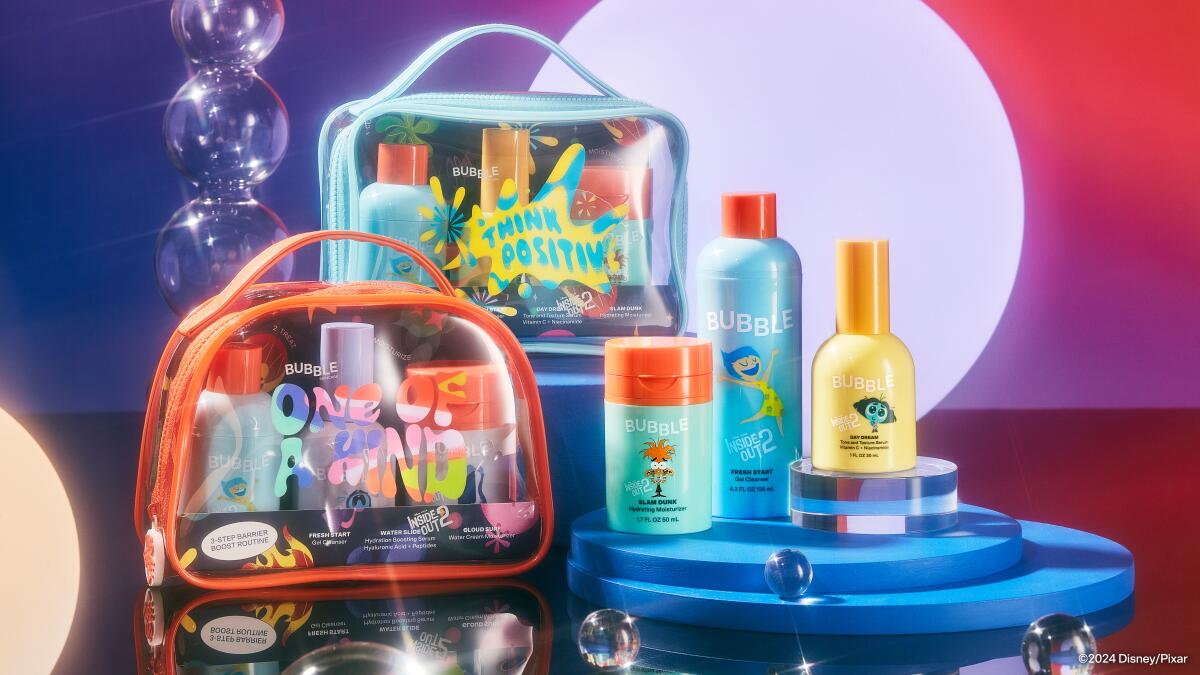Gen Alpha kids are obsessed with skin care thanks to ‘skinfluencers’ and TikTok. Some adults are concerned

- Share via
- Gen Alpha preteens are swarming into beauty stores and buying up cleansers, moisturizers, toners, face masks and, in some cases, potent anti-wrinkle serums, exfoliants and peels.
- Cosmetics brands and the retailers that carry their products are facing a delicate balancing act as they navigate the phenomenon and figure out how to market to a growing cohort of impressionable customers.
Fourth grader Naiya White knows what you think about her twice-daily beauty regimen and her Sephora shopping trips.
“I heard all you guys were freaking out about 10-year-olds using skin care,” she says in a TikTok video posted last month, standing outside a Sephora store in Grand Junction, Colo. “So let’s go pick some out!”
Moments later, White is making her way down the hot pink Glow Recipe aisle in an oversize Lilo & Stitch T-shirt and sparkly green eyeliner, ticking off her favorite products in rapid succession.
“I’d recommend this avocado cleanser; it’s nourishing and gentle,” she says, holding up a $28 tube of face wash. “The mist is also a yes — it makes your skin look super glowy and it’s hydrating. This moisturizer is also one of my favorites and it smells delicious. The hyaluronic Plum Plump balm is a great sleep mask for lips.”
In conclusion, she says with more than a hint of sass, “For all the cranky, musty, dusty adults out there who think little kids shouldn’t be using skin care ... get it together!”
Naiya, 10, is part of a fast-growing army of preteens who are swarming into beauty stores around the country and buying up cleansers, moisturizers, toners, face masks and, in some cases, potent anti-wrinkle serums, exfoliants and peels that are intended to slow the aging process in much older consumers. They’re showing off their multi-hundred-dollar hauls and elaborate morning and nighttime routines on TikTok, where the catchphrase “Sephora Kids” has been hashtagged more than 11,000 times.
The obsession with skin care among Gen Alpha — typically defined as those born between 2010 and 2024 — is leading to a windfall of unexpected business for the booming $164-billion global skin-care industry, which historically has targeted women, not girls. But cosmetics brands and the retailers that carry their products are facing a delicate balancing act as they navigate the phenomenon and figure out how to market to a growing cohort of impressionable customers.

“I don’t want to see younger kids using active ingredients, using exfoliating products, because it’s just not necessary,” said Shai Eisenman, founder and chief executive of Bubble, one of the skin-care lines most coveted by Gen Z and Gen Alpha consumers. “We have a responsibility as a brand, and that responsibility is not to sell as many products as possible.”
In June, cosmetics chain Ulta Beauty released an analysis of customer data that showed members of Gen Alpha become interested in beauty much earlier than their predecessors.
“While Gen Z females started experimenting with beauty products and services around age 13, Gen Alpha is eclipsing them by five years — starting at the average age of 8 for females and males,” the report said. “They also start more concretely defining what beauty means to them around the age of 11.”
The burgeoning demand for skin care, which Ulta Beauty began noticing in the last year, is “driven by the rise of new skin care rituals and trending products on TikTok,” a spokesperson said in a statement, adding that Gen Alpha overwhelmingly views the category as a form of self-care and wellness.
Skin-care mania has divided millennial parents, many of whom grew up washing their faces in the shower with a bar of soap — if at all — and now are baffled by the multistep get-ready-with-me videos that their children are diligently following on social media.
Dermatologists and estheticians say the unease is more than just the usual hand-wringing of an older generation. They worry “skinfluencers” are pushing children to splurge on products that in some cases could cause damage to sensitive young skin, and are concerned the craze is kick-starting an unhealthy fixation with physical appearance.
“A lot of tweens and teens are now using anti-aging products, so they’re starting way too young,” said Dr. Carol Cheng, a pediatric dermatologist and an assistant clinical professor of dermatology at UCLA. In recent months, she has seen some patients arrive for their appointments with “bags of products to make sure they’re optimizing what they’re doing.”
“They’re using things like vitamin C serums, salicylic acid, really expensive products that have actives that can actually harm their skin,” Cheng said, referring to active ingredients meant to address specific conditions such as wrinkles and dark spots. Such harsh chemicals, she added, can cause irritation, redness, burning, peeling and stinging.

At CatEye Beauty Skincare, a boutique day spa in San Diego, girls are bringing in pictures of Korean women with so-called glass skin — a Korean beauty trend that refers to a clear and luminous complexion — and saying, “I want my skin to look like this,” owner Catherine Noel said.
“I’ve had a couple girls come in with very wealthy parents and they wanted a pumpkin peel on their perfect face,” she said. “That would be something for a 35-year-old woman, not somebody who’s 12.”
Amid reports and videos of unsupervised Sephora Kids descending upon the stores en masse, wreaking havoc on product testers and harassing employees, longtime shoppers have taken to the retailer’s online community page to post complaints, including one thread proposing a ban on customers under 16.
“I know that Sephora has basically become the new Claire’s for kids, and buying Drunk Elephant products that are full of actives and retinoids that are harmful to [kids’] skin is the latest Gen Alpha trend, but the testers are getting destroyed,” one customer wrote. “Everything from kids mixing skincare and makeup testers together to make ‘smoothies’ to opening new makeup packages and using them.”
Any video Naiya and I make at Sephora or Ulta, people have something to say. But I feel like a lot of adults forget what it’s like to be a child.
— Ashley Paige, Naiya White’s mom
The backlash hasn’t stopped Ashley Paige, Naiya White’s mom, from taking her to Sephora and Ulta Beauty a couple of times a month and filming their excursions for the more than 40,000 people who follow their joint TikTok page, @sparkleandchaos.
“Any video Naiya and I make at Sephora or Ulta, people have something to say,” Paige, 37, said in an interview with The Times. “But I feel like a lot of adults forget what it’s like to be a child.”
The duo’s first video, posted in January, addressed the controversy head-on, with Naiya instructing fellow Sephora Kids on how to behave politely in the stores.
“I heard they were about to ban testers because of us — that is not OK. Girls, clean up after yourselves,” she says in the video, which has been viewed more than 6 million times. “You need to be polite to all the people who work here, OK? You want a good rep, not a bad one.”
Industry professionals say an early introduction to skin care can be a positive thing if messaged correctly.
They’re steering young skin-care enthusiasts away from products with active ingredients and focusing instead on a minimalist approach centered on helping them develop healthy daily habits. The three basics, they say, are appropriate for any age: a gentle cleanser, a hydrating moisturizer and a good sunscreen.
That’s generally the protocol that Naiya follows, albeit with some extra steps.

“In the morning, I like to use my Bubble face wash and my Bubble Cloud Surf moisturizer and my Bubble tinted sunscreen,” Naiya said. Bubble launched in 2020 as a Gen Z-oriented brand with eye-catching packaging in vibrant colors and bold fonts, and quickly caught on with younger kids as well.
“At night is when I use my Evereden kids multivitamin face wash and Evereden kids multivitamin face cream — it smells floral-y,” Naiya continued. “Sometimes I use toner. I also use the Aquaphor balm under my eyes to help with puffiness and stuff.”
Gen Alpha already wields significant spending power and is expected to become an economic force in the coming years. Companies of all kinds are developing new products to appeal to the demographic, which is growing rapidly with more than 2.8 million children born globally every week. By the end of the year, they will number nearly 2 billion — the largest generation ever, according to McCrindle Research, which is credited with coining the term.
Ulta Beauty, which operates more than 1,400 stores in all 50 states, said that in response to greater interest among Gen Alpha, it has “expanded our offerings to include simplified, dermatologist-approved products designed for younger skin.” In its most recent fiscal year, total sales increased 9.8% to $11.2 billion, with skin care accounting for 19% of company revenue, up from 17% the year prior.

“We do not proactively promote skin care to Gen Alpha,” a spokesperson said. “As more younger shoppers engage with us, we focus on guiding them — and their parents — toward informed choices” including educational resources, ingredient-based guidance and age-specific training for store associates.
That said, beauty companies are routinely teaming up with entertainment brands and toy makers to release kid-friendly limited-edition collections.
Ulta Beauty on Sunday launched two partnerships: an assortment of makeup, skin-care and hair-care items tied to the November release of Universal Pictures’ movie musical “Wicked,” as well as a separate collection with Mini Brands, featuring tiny $9.99 replicas of many of the chain’s bestselling products.
“All your favorite beauty brands are now cuter and more collectible than ever with Mini Brands x Ulta Beauty!” the retailer’s website says. “With over 68 different minis to collect, every unboxing is a fun surprise!”
Bubble used similar playful language in its recent rollout of Bubble Charms, “the CUTEST way to accessorize your Tell All Lip Balm.” The lip balm “comes with an adorbz keychain” and “will make your crush text u back,” the company says on its website.
In May, Bubble announced a collaboration with Pixar tied to the release of “Inside Out 2,” an animated film about the roiling emotions of puberty that grossed $1.6 billion worldwide at the box office. The products included in the limited-edition Pixar collection were safe for all ages, Eisenman said.

Today Bubble has about 50,000 brand ambassadors who help promote the company, participate in its product testing program and receive special discounts and freebies; 20,000 of them are 13 to 18 years old. On Bubble’s website and social media posts, the company routinely highlights which products and practices are suitable for kids.
“Just cuz you saw it on TikTok doesn’t mean it’s right for your face!” reads the caption in a Bubble Instagram post this year that featured a three-step skin-care routine for customers under 13. “Great skincare can be super simple.”
“A lot of younger kids are using products that are inappropriate,” Eisenman said. “For us, one of the most important elements is to be a good force and an educating source in this space.”
At CatEye Beauty, owner Noel added a “teen facial with skincare lesson” to her list of services in March. The $120, 45-minute treatment is designed for people 11 to 15 years old and includes a double cleanse, mild exfoliation and, if necessary, extractions to clear out clogged pores.
“They still have baby skin,” she said. “I don’t like this trend of young girls coming in and using very expensive products, especially since they’re made for adults.”
I’ve had a couple girls come in with very wealthy parents and they wanted a pumpkin peel on their perfect face. That would be something for a 35-year-old woman, not somebody who’s 12.
— Catherine Noel, owner of CatEye Beauty Skincare
Gen Alpha’s love of skin care is even prompting consternation among Gen Z.
At Larchmont Beauty Center on a recent Friday afternoon, eighth grader Maren and her friend Shiri stopped in to pick up a pack of hair bands. The two are on the border of Gen Z and Gen Alpha, but consider themselves members of the older demographic.
“Our generation is a lot more chill,” Maren said. “I feel like millennials are full-face and we’re just like, some makeup. And then the people younger than us are like: skin care.”
Calling the trend “a little freaky,” the 14-year-old said she knows of kids “who are like 9, and they’re doing the same stuff I’m doing.”
“It’s insane that like a 9-year-old who has perfect skin is doing a 12-step skin-care routine.”
More to Read
Inside the business of entertainment
The Wide Shot brings you news, analysis and insights on everything from streaming wars to production — and what it all means for the future.
You may occasionally receive promotional content from the Los Angeles Times.










